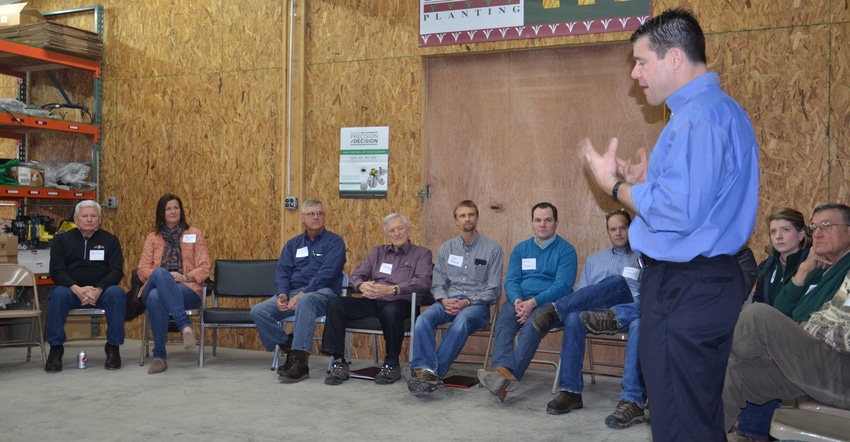
Sen. Todd Young came to Tom and Karen McKinney’s Tipton, Ind., farm to hear what farmers and ag business people had on their minds. With farm bill debates coming soon, he told the crowd gathered in the McKinneys’ office complex that he needed to know what issues were important.
Sonny Beck, Atlanta, Ind., didn’t hold back in sharing what was extremely important to him. Beck, who co-founded Beck’s with his father, Francis, is recognized as a national leader in the seed industry.
“The way we market grain in this country is limiting access to the latest technology for our farmers,” Beck said. “New technologies can earn approval from EPA, FDA and USDA, but be held up because they aren’t approved by foreign countries. Farmers essentially don’t have access to the technology, even though it’s been deemed safe by our own federal agencies.
“That prevents our farmers from using technology which could produce more,” he said.
Beck cited two specific examples. One is the Viptera GMO trait for insect resistance developed by Syngenta. Several seed companies, including Beck’s, can finally offer corn hybrids with the Viptera trait.
“It was held up for years because a foreign government wouldn’t approve it,” Beck explained. “If it’s not approved for export, most companies won’t release the trait. Most grain marketing companies don’t want to risk the chance that it will wind up in grain exported to countries where it isn’t approved.”
When that happened more than a decade ago with a trait known as Star Link, it turned out to be a fiasco of major proportions.
Another trait that still isn’t approved is Enlist, which allows a special formulation of 2,4-D developed by Dow AgroSciences to be sprayed over 2,4-D-tolerant crops. It’s finally being released in 2018 in a limited fashion to farmers willing to work with a specific grain merchandiser who will funnel the grain through domestic channels.
Possible solution
China is the biggest offender, Beck told Young. They don’t test GMOs themselves, and the country’s approval process has slowed considerably — and sometimes appears to almost stopped. Beck believes the driving factors are politics and price, not whether the technology is safe.
Beck had a solution ready when Young asked for one. Beck and others first proposed the solution in 2014.
“We would have a three-silo system for marketing grain,” he said. The first “silo” would consist of all grain with any or all U.S. approved biotech traits. “If a trait is legal here, it could be used and marketed through this option,” he said. “It would be the cheapest grain we can produce.”
The second silo would be non-GMO grain, raised from hybrids and varieties without biotech traits. Naturally, this grain would fetch higher prices. “It’s what Europe prefers, and if they want to pay for it, our farmers will grow it,” he said.
The third silo would be organic grain, produced for those who prefer it and offered at the highest price of all three options.
“Farmers can grow what people want and are willing to pay for,” Beck concluded. “We feel they ought to have the right to the latest technology available if it’s approved in the U.S. Let farmers grow it and let buyers and the market decide what they want to purchase. Don’t let foreign countries decide what’s grown on U.S. farms.”
About the Author(s)
You May Also Like




